-
ARTÍCULO ORIGINAL16/12/2024
Editorial discourses in the history of Acta Paulista de Enfermagem (1988-2017)
Revista Brasileira de Enfermagem. 2024;77(6):e20230362
Resumen
ARTÍCULO ORIGINALEditorial discourses in the history of Acta Paulista de Enfermagem (1988-2017)
Revista Brasileira de Enfermagem. 2024;77(6):e20230362
DOI 10.1590/0034-7167-2023-0362
Visualizações0Ver maisABSTRACT
Objectives:
to analyze the editorial discourses of Acta Paulista de Enfermagem from 1988 to 2017.
Methods:
qualitative, historical, oral research, with interviews with the journal’s editors. Statements were categorized and presented in three decades, discussed from Foucault’s archaeological perspective.
Results:
seven statements presented three discourses. In the first decade, the discourse of knowledge registration and circulation presented statements of graduate studies and professional recognition. In the second decade, knowledge internationalization was added, with statements of business and editorial panopticism, selection criteria, indexing and digitalization. Finally, the discourse of shifting scientific assessment centrality was added with statements of preprint, open science, exclusive digitalization and mediatization of science.
Final Considerations:
the journal needed to adapt to form its official discourse, which made it possible, over the years, to change its initial peripheral position to a central one within scientific communication, supporting its panoptic role.
-
ARTÍCULO DE REVISIÓN16/12/2024
Strategies for expanding vaccination coverage in children in Brazil: systematic literature review
Revista Brasileira de Enfermagem. 2024;77(6):e20230343
Resumen
ARTÍCULO DE REVISIÓNStrategies for expanding vaccination coverage in children in Brazil: systematic literature review
Revista Brasileira de Enfermagem. 2024;77(6):e20230343
DOI 10.1590/0034-7167-2023-0343
Visualizações1Ver maisABSTRACT
Objectives:
to identify the strategies found in the literature for increasing vaccination coverage among children in Brazil. It is justified mainly by the current scenario of falling vaccination coverage.
Methods:
systematic literature review. The search was carried out in the Pubmed (MEDLINE), Embase and Scopus databases, following the PRISMA guidelines.
Results:
initially, 4,824 results were returned. In the end, 6 studies were included for narrative synthesis using the SWiM methodology. Of these, 50% dealt with studies related to the Bolsa Família Program (PBF). The others explored strategies for approaching parents directly, Rapid Vaccination Monitoring (MRV) and the Community Health Agents Program (PACS). The PBF did not guarantee compliance with the conditionality of keeping vaccinations up to date. The MRV and PACS are effective strategies, especially because they allow active search for absentees.
Conclusions:
we conclude that more publications are needed on strategies to increase vaccination coverage among children in Brazil.

-
ARTÍCULO ORIGINAL16/12/2024
Educational technology to empower patients as participants in their care
Revista Brasileira de Enfermagem. 2024;77(6):e20230359
Resumen
ARTÍCULO ORIGINALEducational technology to empower patients as participants in their care
Revista Brasileira de Enfermagem. 2024;77(6):e20230359
DOI 10.1590/0034-7167-2023-0359
Visualizações0Ver maisABSTRACT
Objectives:
to build and validate an educational technology to empower patients as participants in their own care.
Methods:
methodological study to develop an educational technology based on the elaboration, validation, and evaluation that were carried out in five stages at a teaching hospital in Amazonas. The study was carried out from 2019 to 2022, with the participation of 19 judges specialized in patient safety and 72 patients admitted to the hospital’s medical and surgical clinics, the study setting.
Results:
the agreement between the judges obtained an overall index of 0.85, being considered validated. The overall analysis of the booklet obtained an assessment of the level of agreement above 85%.
Final Considerations:
the educational technology presented here was validated and suitable for promoting patient/professional rapprochement and consolidating health care in a way that increases the patient’s ability to contribute to their treatment and prevent the occurrence of adverse events.

-
ARTÍCULO ORIGINAL13/12/2024
Educational booklet on labor and delivery: validity study
Revista Brasileira de Enfermagem. 2024;77(5):e20240138
Resumen
ARTÍCULO ORIGINALEducational booklet on labor and delivery: validity study
Revista Brasileira de Enfermagem. 2024;77(5):e20240138
DOI 10.1590/0034-7167-2024-0138
Visualizações2Ver maisABSTRACT
Objectives:
to develop and validate an educational booklet on labor and delivery for pregnant women.
Methods:
this methodological study involved constructing and validating a booklet based on Echer’s framework. We used the Content Validity Index and Cronbach’s alpha for content and face validation, selecting judges according to Fering’s criteria. We then conducted a clinical validation with the target population.
Results:
the booklet, developed based on evidence from an integrative review and validated by judges and the target audience, achieved global Content Validity Index of 0.919 and 0.913, respectively. After clinical validation with 22 pregnant women, it included 28 topics and 48 pages, with illustrations by a graphic designer.
Conclusions:
expert judges and the target audience considered this educational technology valid, deeming it a relevant tool for promoting the health of pregnant women.

-
ARTÍCULO ORIGINAL13/12/2024
Interobserver agreement in Reception and Risk Stratification in Obstetrics implementation
Revista Brasileira de Enfermagem. 2024;77(5):e20230361
Resumen
ARTÍCULO ORIGINALInterobserver agreement in Reception and Risk Stratification in Obstetrics implementation
Revista Brasileira de Enfermagem. 2024;77(5):e20230361
DOI 10.1590/0034-7167-2023-0361
Visualizações0Ver maisABSTRACT
Objectives:
to analyze interobserver agreement in the Reception and Risk Stratification in Obstetrics protocol implementation.
Methods:
a cross-sectional study carried out during Reception and Risk Stratification in Obstetrics implementation, conducted in a tertiary hospital in southern Brazil with 891 participants in January 2020. Descriptive and interobserver agreement analysis was carried out using the Kappa coefficient in the risk stratification assigned by the triage nurse and reviewed by the researcher.
Results:
around half of the calls (55.6%) were stratified as not very urgent (green), followed by urgent (yellow) (31.8%), very urgent (orange) (9.3%), not urgent (blue) (3.4%) and no emerging stratification (red). Agreement analysis of revised stratification found Kappa values of 0.20 (blue), 0.54 (green), 0.77 (yellow) and 0.80 (orange).
Conclusions:
most appointments were non-urgent. The agreement analysis between the revised and assigned risk stratification revealed greater interobserver agreement as the priority level increased.
-
13/12/2024
Training of Brazilian indigenous nurses: between human rights, valuing diversity and inclusion
Revista Brasileira de Enfermagem. 2024;77(5):e20230430
Resumen
Training of Brazilian indigenous nurses: between human rights, valuing diversity and inclusion
Revista Brasileira de Enfermagem. 2024;77(5):e20230430
DOI 10.1590/0034-7167-2023-0430
Visualizações0Ver maisABSTRACT
Objectives:
to analyze the possibilities and potential of training indigenous nurses, given the Brazilian Health System (SUS), understanding the relationships between education and health.
Methods:
theoretical-reflective study, based on scientific literature, aligned with the experience, critical thinking of its authors and the Sustainable Development Goals in Brazil.
Results:
this text articulates three axes: Potential for including indigenous students in nursing training; Paths to achieving equity through inclusion and retention policies for indigenous students at different levels; and Implications of this for the SUS and global health.
Final Considerations:
indigenous students, beneficiaries of affirmative actions, face challenges of inclusion and retention in public universities that directly impact their academic training. Added to this are the difficulties identified in basic education, professor training and implementation of permanence policies, with consequences for services and training at other levels.
-
ARTÍCULO ORIGINAL13/12/2024
Stress in nursing workers caring for people with COVID-19
Revista Brasileira de Enfermagem. 2024;77(5):e20230542
Resumen
ARTÍCULO ORIGINALStress in nursing workers caring for people with COVID-19
Revista Brasileira de Enfermagem. 2024;77(5):e20230542
DOI 10.1590/0034-7167-2023-0542
Visualizações1Ver maisABSTRACT
Objectives:
to analyze stress from the perspective of nursing workers caring for people with COVID-19 in a public hospital in the Recôncavo region of Bahia.
Methods:
this is an exploratory qualitative study, conducted through semi-structured interviews. The data were analyzed using word clouds, similarity trees, and content analysis.
Results:
nursing workers were exposed to stress while attending to patients with COVID-19. The reported stressors in the workplace included: work overload, lack of planning, speed in performing tasks, fatigue, lack of participation in decision-making, lack of support from management, technological changes, excessive responsibility without preparation, interpersonal conflicts, and professional undervaluation.
Conclusions:
exposure to these stressors leads to emotional exhaustion and demotivation, which were intensified during the COVID-19 pandemic.

-
ARTÍCULO ORIGINAL13/12/2024
Adaptation and implementation of a Nursing care protocol for children in the Amazon Region
Revista Brasileira de Enfermagem. 2024;77(5):e20230245
Resumen
ARTÍCULO ORIGINALAdaptation and implementation of a Nursing care protocol for children in the Amazon Region
Revista Brasileira de Enfermagem. 2024;77(5):e20230245
DOI 10.1590/0034-7167-2023-0245
Visualizações0Ver maisABSTRACT
Objectives:
to describe the process of implementing an adapted protocol for pediatric nursing care in a health unit located in a municipality in the Amazon Region.
Methods:
methodological research conducted in a basic health unit with four family health teams in the state of Rondônia, involving seven nursing professionals. Data collection occurred between October 2020 and April 2022, following the research phases: situational diagnosis, exploratory phase, protocol definition, implementation, and evaluation.
Results:
the outcome was the adaptation and implementation of a nursing care protocol for children.
Final Considerations:
the adaptation and implementation process can be an effective approach to improving care, strengthening nursing as a profession with a solid foundation in scientific and clinical evidence. This facilitates early problem identification and appropriate guidance, leading to better health outcomes for children.
-
ARTÍCULO DE REVISIÓN30/03/2020
Internet influence on the biopsychosocial health of adolescents: an integratitive review
Revista Brasileira de Enfermagem. 2020;73(2):e20180766
Resumen
ARTÍCULO DE REVISIÓNInternet influence on the biopsychosocial health of adolescents: an integratitive review
Revista Brasileira de Enfermagem. 2020;73(2):e20180766
DOI 10.1590/0034-7167-2018-0766
Visualizações0Ver maisABSTRACT
Objectives:
To identify scientific evidence on the influence of internet use on adolescents’ biopsychosocial health.
Methods:
Integrative review, with database search, using the descriptors “internet”, “adolescent health” and “adolescent behavior”. After applying the inclusion and exclusion criteria, 16 articles were selected.
Results:
Knowledge convergence produced for three main themes was demonstrated: “Internet exposure time and possible damages to adolescent health”; “Internet, adolescent and cyberbullying”; and “Internet as a source of information for adolescent health”.
Final considerations:
The network involves an intricate network of interactions, providing varied behaviors and attitudes that reflect on adolescent health. Therefore, it is important to articulate nursing actions with the school community and the family, in order to carry out health education.
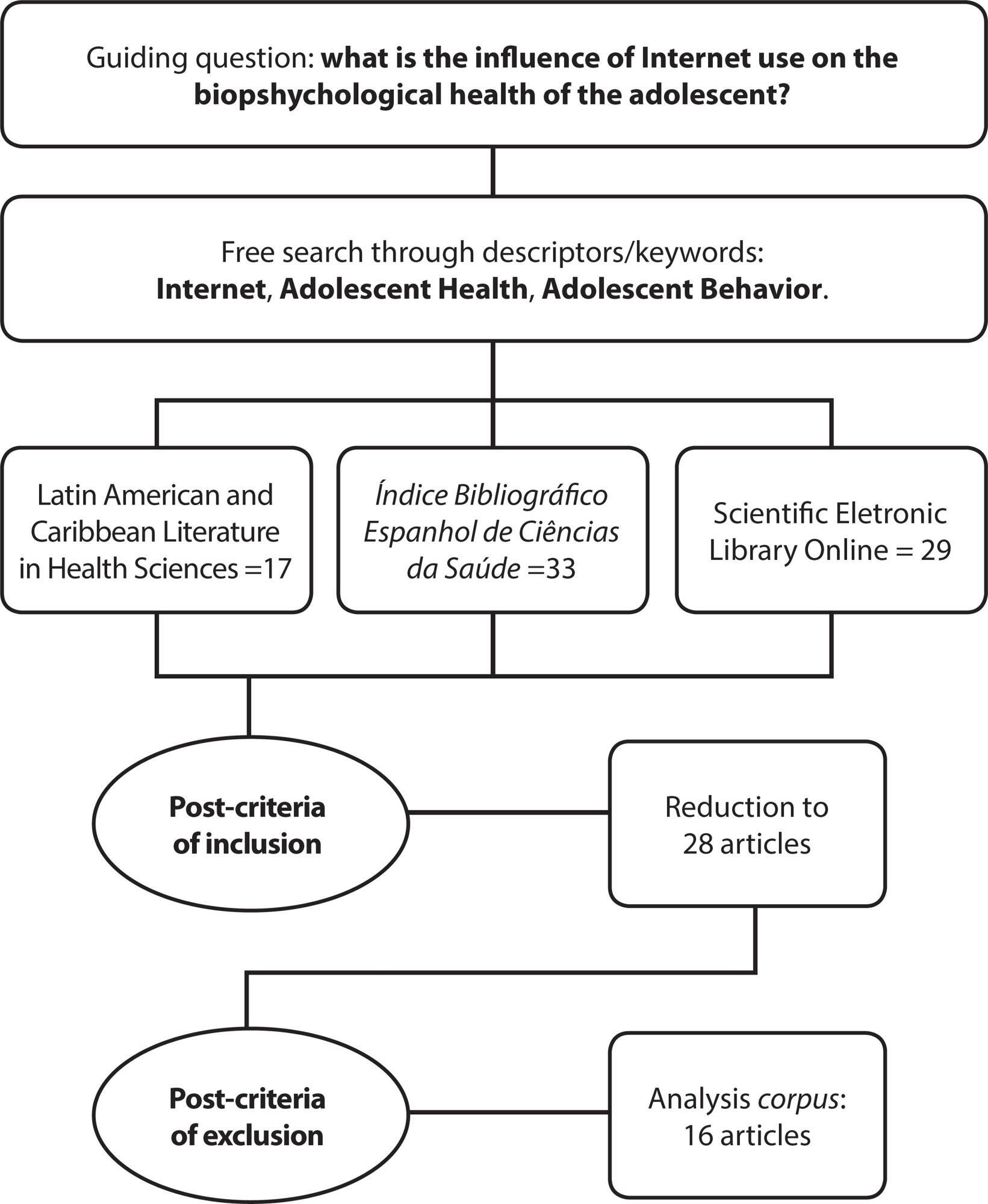
-
ARTÍCULO DE REVISIÓN21/12/2020
Hope-based interventions in chronic disease: an integrative review in the light of Nightingale
Revista Brasileira de Enfermagem. 2020;73:e20200283
Resumen
ARTÍCULO DE REVISIÓNHope-based interventions in chronic disease: an integrative review in the light of Nightingale
Revista Brasileira de Enfermagem. 2020;73:e20200283
DOI 10.1590/0034-7167-2020-0283
Visualizações0Ver maisABSTRACT
Objective:
To identify the available evidence in the scientific literature about the strategies or interventions used to promote hope in people with chronic diseases.
Method:
An integrative literature review of literature published between 2009-2019, which was conducted in online browsers/databases: b-On, EBSCO, PubMed, Medline, ISI, SciELO, PsycINFO, Google Scholar. Forty-one studies were found, of which eight met the inclusion criteria.
Results:
Most studies used a quantitative approach. There was a predominance of studies from Asia and America, addressing patients with multiple sclerosis, diabetes, congestive heart failure, and cancer. Hope-based interventions were categorized by the hope attributes: experiential process, spiritual/transcendence process, rational thought process, and relational process.
Conclusion:
Hope-based interventions, in its essence, are good clinical practices in the physical, psychological, social and spiritual domains. This is congruent with the vision of nursing, first proposed by Florence Nightingale. There seem to be gaps in the literature regarding specific hope promoting interventions.
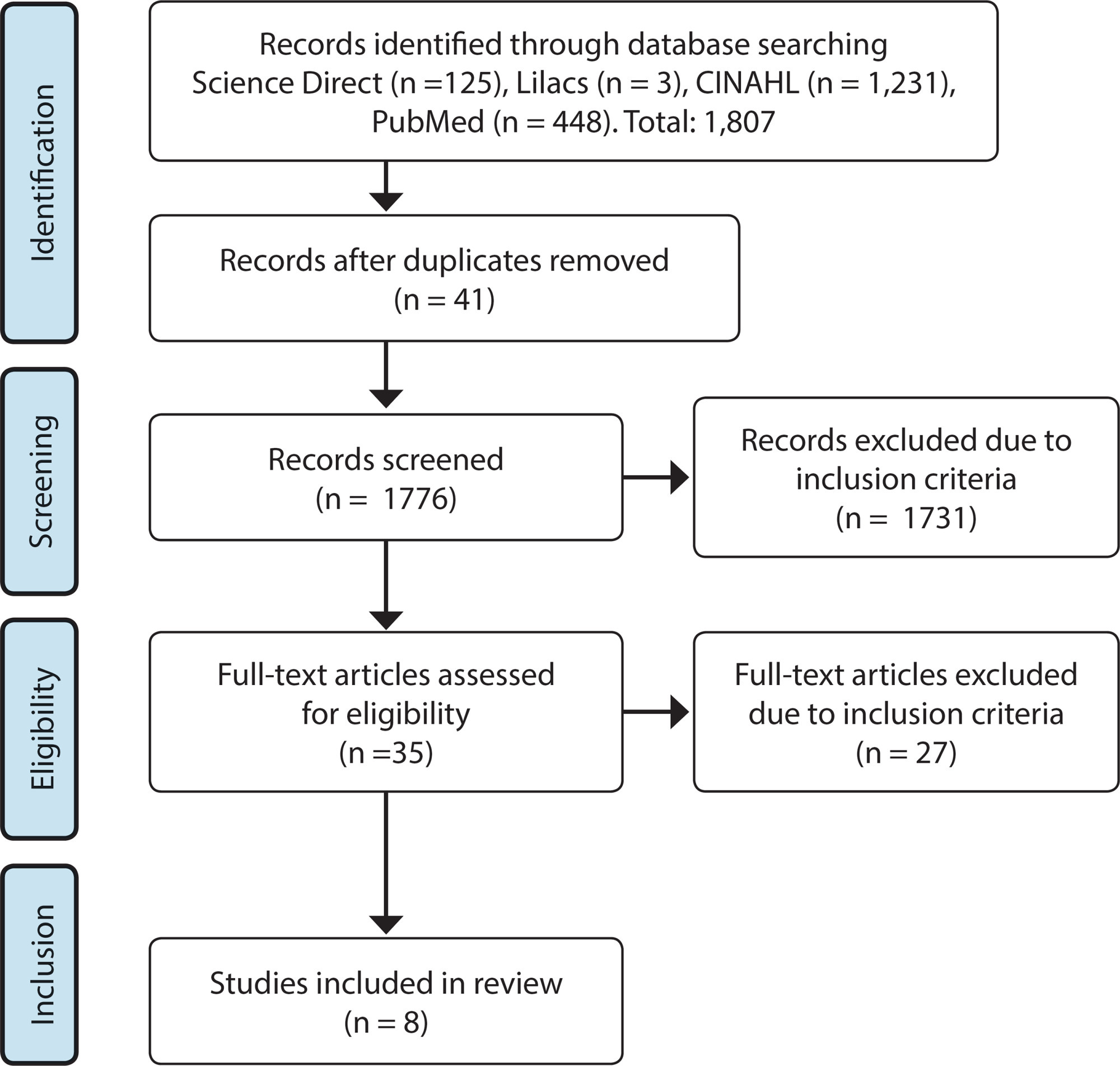
-
REFLEXIÓN10/07/2020
Psychosocial risks and the health of health workers: reflections on Brazilian labor reform
Revista Brasileira de Enfermagem. 2020;73:e20190092
Resumen
REFLEXIÓNPsychosocial risks and the health of health workers: reflections on Brazilian labor reform
Revista Brasileira de Enfermagem. 2020;73:e20190092
DOI 10.1590/0034-7167-2019-0092
Visualizações0Ver maisABSTRACT
Objective:
to reflect on the psychosocial risks and their impacts on the health of health workers in light of the Brazilian economic context and Labor Reform.
Method:
reflective study on the Brazilian Labor Reform and its impacts on health of health workers.
Results:
although the changes observed in the labor sphere have contributed to improvements in health and safety policies for, these changes have also contributed to the emergence of new risks arising from work activities, including psychosocial risks, which affect all occupational categories.
Final considerations:
we understand that the Brazilian Labor Reform carried out in 2017 leads to the weakening of labor relations, increases workers’ exposure to risks in the workplace, increases the risk of illness, and opposes the global movement of international organizations aimed at the prevention of aggravation in workers’ health and also at preserving their health.
-
REFLEXIÓN29/06/2020
Recommendations in covid-19 times: a view for home care
Revista Brasileira de Enfermagem. 2020;73:e20200310
Resumen
REFLEXIÓNRecommendations in covid-19 times: a view for home care
Revista Brasileira de Enfermagem. 2020;73:e20200310
DOI 10.1590/0034-7167-2020-0310
Visualizações0Ver maisABSTRACT
Objective:
To suggest recommendations for the practice of Home Nursing in the context of COVID-19.
Method:
Reflective study, originated from readings associated with the theme, available in current guidelines from the Pan American Health Organization, World Health Organization and the Ministry of Health.
Results:
Recommendations were developed from current scientific evidence for prevention of infections, control of epidemics and pandemics in the Brazilian home scenario.
Final considerations:
the reflections achieved contribute to guiding actions for better assistance to the patient, family caregivers and the community in the perspective of safe home care with COVID-19, and it is characterized as an introductory discussion on the theme, encouraging new studies to be carried out from the unfolding of the current scenario.
-
ARTÍCULO DE REVISIÓN29/09/2022
Nursing students’ learning from involvement in research projects: an integrative literature review
Revista Brasileira de Enfermagem. 2022;75(1):e20210053
Resumen
ARTÍCULO DE REVISIÓNNursing students’ learning from involvement in research projects: an integrative literature review
Revista Brasileira de Enfermagem. 2022;75(1):e20210053
DOI 10.1590/0034-7167-2021-0053
Visualizações0Ver maisABSTRACT
Objective:
To identify the learning outcomes and skills obtained of undergraduate nursing students involved in research projects.
Methods:
This was an integrative literature review, based on a research protocol in the CINAHL Complete databases; Cochrane Central Register of Controlled Trials; Cochrane Database of Systematic Reviews; Cochrane Methodology Register; MedicLatina; MEDLINE, Scopus and JBI, including primary and secondary studies, published between 2015 and 2020.
Results:
A total of five heterogeneous articles were included, which were categorized using Kirkpatrick’s (adapted) model. Seventeen learning outcomes acquired through participation in research projects were identified, from the learning of new knowledge and skills to the development of new attitudes and behaviors.
Final considerations:
The involvement of nursing students in research projects is important to their professional development. Future investment in research on this topic can help cement the potential of this type of student involvement.
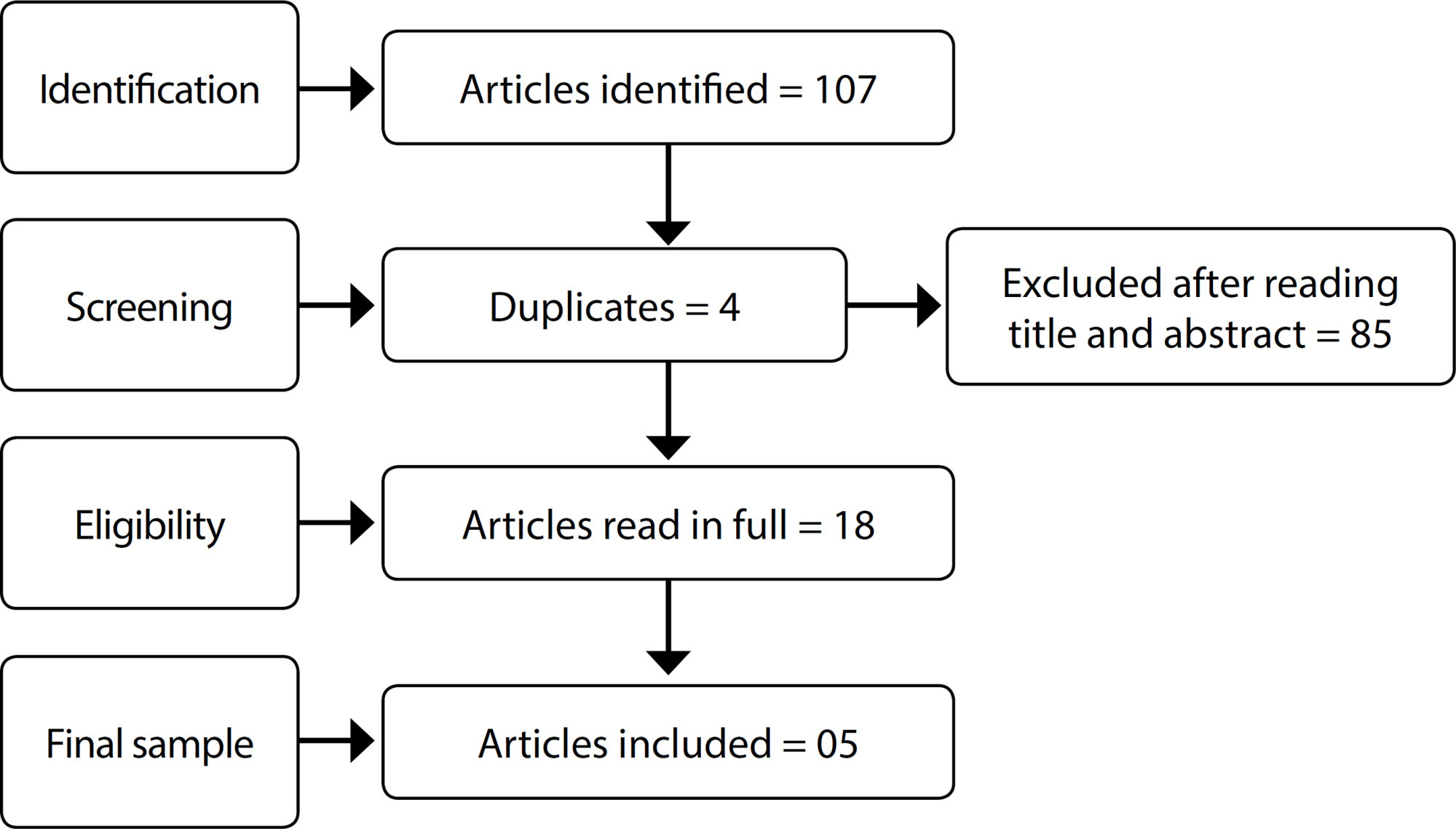
-
ARTÍCULO ORIGINAL21/10/2019
Hipermídia educativa sobre assistência de enfermagem ao parto: construção e validação de conteúdo e aparência
Revista Brasileira de Enfermagem. 2019;72(6):1471-1478
Resumen
ARTÍCULO ORIGINALHipermídia educativa sobre assistência de enfermagem ao parto: construção e validação de conteúdo e aparência
Revista Brasileira de Enfermagem. 2019;72(6):1471-1478
DOI 10.1590/0034-7167/2018-0163
Visualizações1Ver maisRESUMO
Objetivo:
construir uma hipermídia educativa sobre a assistência de enfermagem ao parto de risco habitual e realizar a validação de conteúdo e de aparência.
Método:
pesquisa metodológica, realizada seguindo as seguintes etapas: levantamento do conteúdo e planejamento dos módulos; produção das mídias e organização das unidades tutoriais; organização do espaço do aluno, tutor e de comunicação entre eles; elaboração da hipermídia; disponibilização da hipermídia; avaliação por especialistas em Enfermagem e Informática; e implementação das sugestões propostas.
Resultados:
a hipermídia educativa mostrou-se como um material validado, visto que apresentou um ótimo índice de validade de conteúdo global de 0,97 e significância estatística no teste binomial para o conteúdo e aparência.
Conclusão:
acredita-se que o uso deste material com alunos da graduação em Enfermagem contribuirá com a qualidade da assistência obstétrica, tendo em vista que se constitui em uma tecnologia ilustrada capaz de favorecer o ensino-aprendizagem sobre parto normal humanizado.
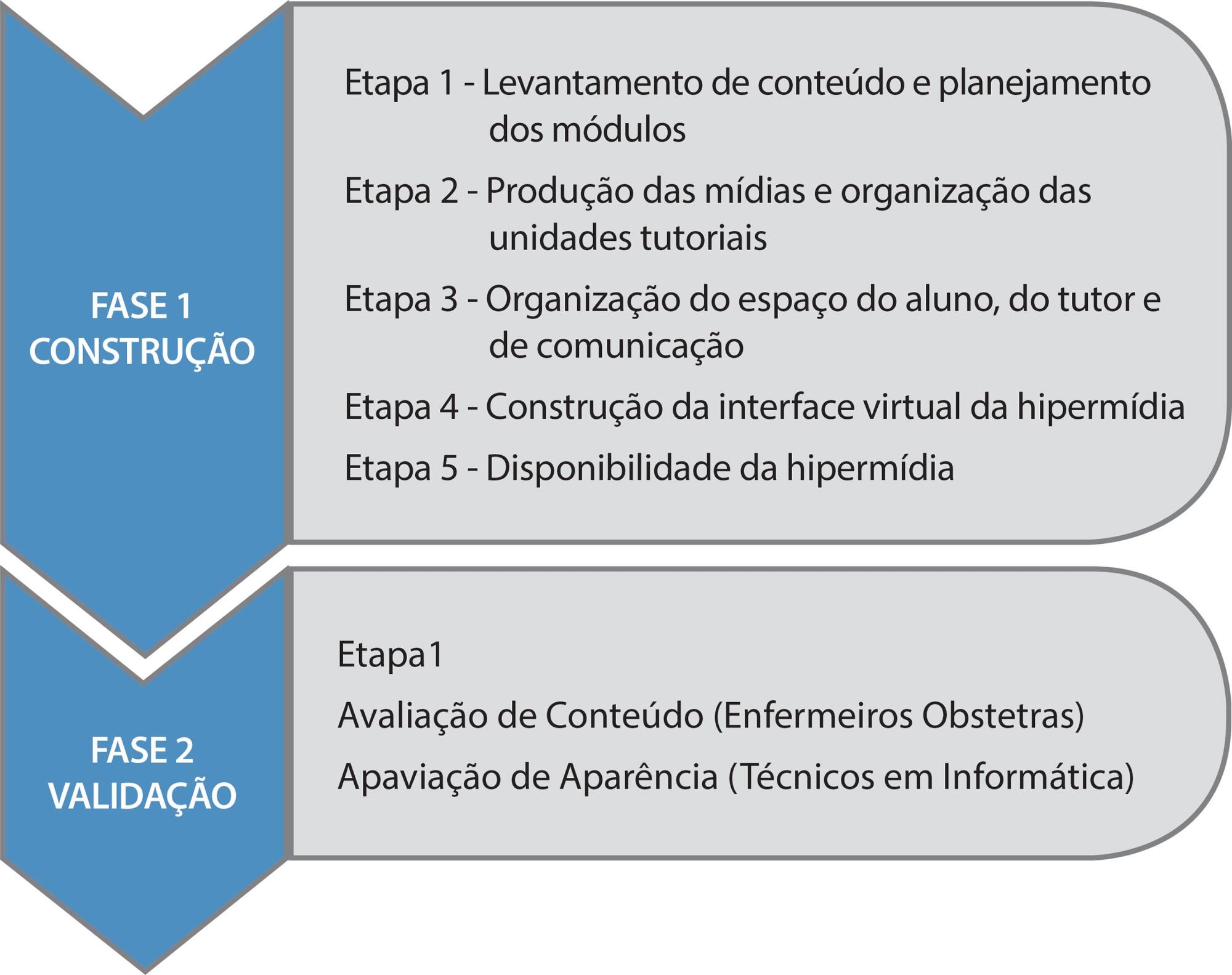
-
ARTÍCULO ORIGINAL30/03/2020
Boas Práticas de segurança nos cuidados de enfermagem em Terapia Intensiva Neonatal
Revista Brasileira de Enfermagem. 2020;73(2):e20180482
Resumen
ARTÍCULO ORIGINALBoas Práticas de segurança nos cuidados de enfermagem em Terapia Intensiva Neonatal
Revista Brasileira de Enfermagem. 2020;73(2):e20180482
DOI 10.1590/0034-7167-2018-0482
Visualizações0RESUMO
Objetivos:
identificar a percepção dos profissionais de enfermagem sobre o erro humano nos cuidados de enfermagem na Unidade de Terapia Intensiva Neonatal; analisar as estratégias de Boas Práticas propostas por esses profissionais para a segurança do paciente nos cuidados de enfermagem.
Métodos:
estudo quanti-qualitativo, descritivo. Cenário: Unidade de Terapia Intensiva Neonatal. Participantes: 22 profissionais de enfermagem. Coleta dos dados realizada por meio de entrevistas e submetidos a análise temática.
Resultados:
erro humano nos cuidados de enfermagem, identificando-se perdas de cateteres e erros no processo de medicação; causas para o erro nos cuidados de enfermagem, destacando-se a sobrecarga de trabalho; Boas Práticas para a segurança do paciente nos cuidados de enfermagem, como capacitação profissional e melhorias das condições de trabalho.
Conclusões:
demonstra-se a importância de investir em estratégias de Boas Práticas para a Segurança do Paciente, buscando-se sedimentar a cultura de segurança organizacional e estimular um ambiente propício ao gerenciamento do erro.
Palavras-chave: EnfermagemErros MédicosGestão de SegurançaSegurança do PacienteUnidades de Terapia Intensiva NeonatalVer mais -
05/12/2019
Hospital care and urinary incontinence in the elderly
Revista Brasileira de Enfermagem. 2019;72:284-293
Resumen
Hospital care and urinary incontinence in the elderly
Revista Brasileira de Enfermagem. 2019;72:284-293
DOI 10.1590/0034-7167-2018-0273
Visualizações0Ver maisABSTRACT
Objective:
to identify factors inherent in hospital care that favor urinary incontinence in the elderly.
Method:
an integrative review with Scopus, CINAHL and Pubmed searches. Includes original articles, no language restriction, published between 2008 and 2018. Rated level of recommendation and level of evidence were assessed using the Oxford Center for Evidence-Based Medicine classification. Exploited content through thematic analysis in light of the Donabedian model.
Results:
13 articles constituted the sample. There were factors such as the unjustified and indiscriminate use of devices such as the geriatric diaper; hospital structure adversely affecting the needs of the elderly; and deficit in screening, risk identification and underreporting of the problem favor urinary incontinence in the hospitalized elderly.
Conclusion:
modifiable factors related to hospital structures and care processes favor both the onset and worsening of urinary incontinence in the elderly.
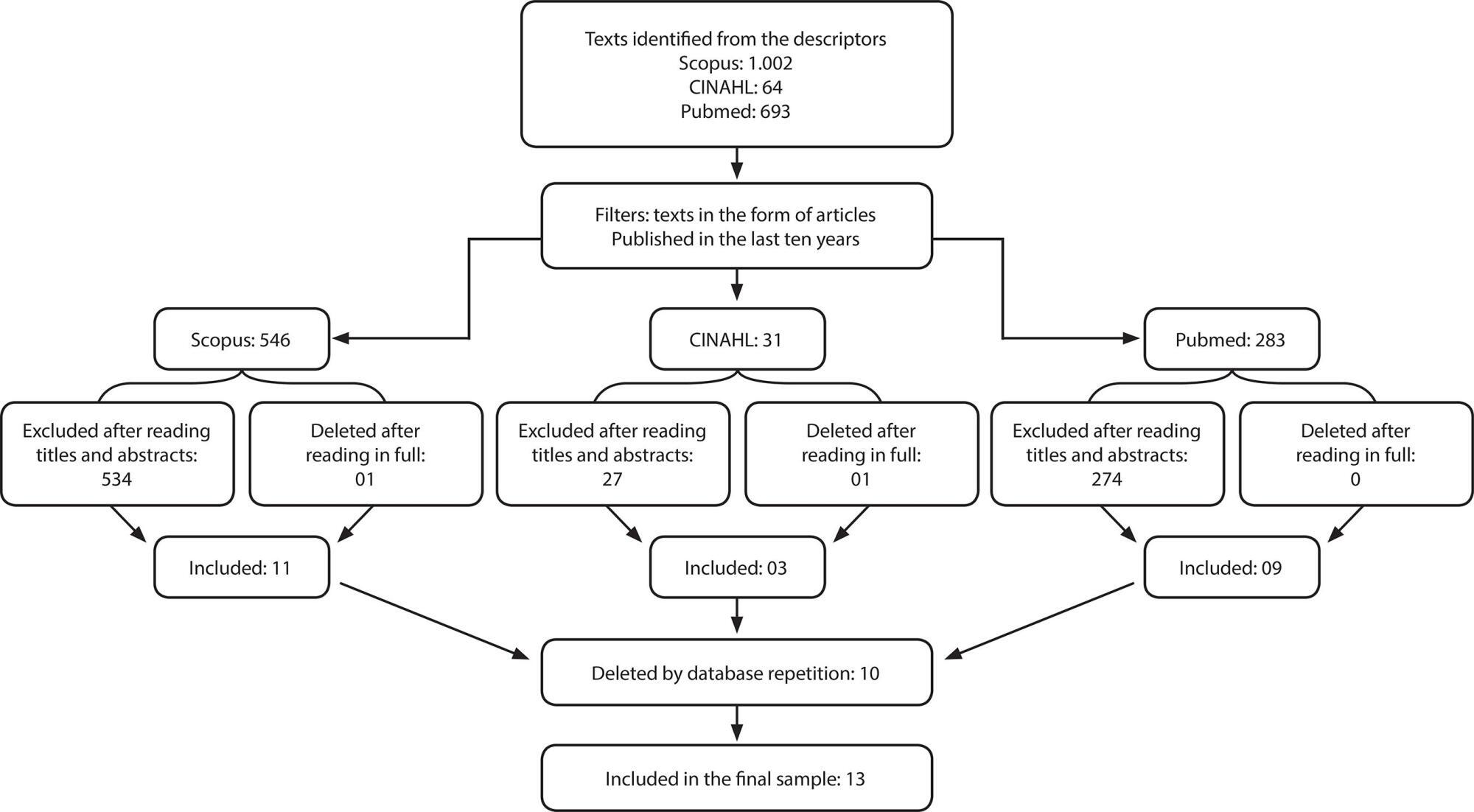
Búsqueda
Buscar en:
Nuvem de Tags
Adolescente (85) Atenção Primária à Saúde (239) COVID-19 (91) Criança (91) Cuidados de Enfermagem (269) Educação em Enfermagem (151) Educação em Saúde (139) Enfermagem (930) Enfermagem Pediátrica (86) Estudantes de Enfermagem (77) Estudos de Validação (131) Família (87) Idoso (208) Promoção da Saúde (99) Qualidade de Vida (104) Saúde do Trabalhador (86) Saúde Mental (145) Saúde Pública (82) Segurança do Paciente (150) Tecnologia Educacional (100)



